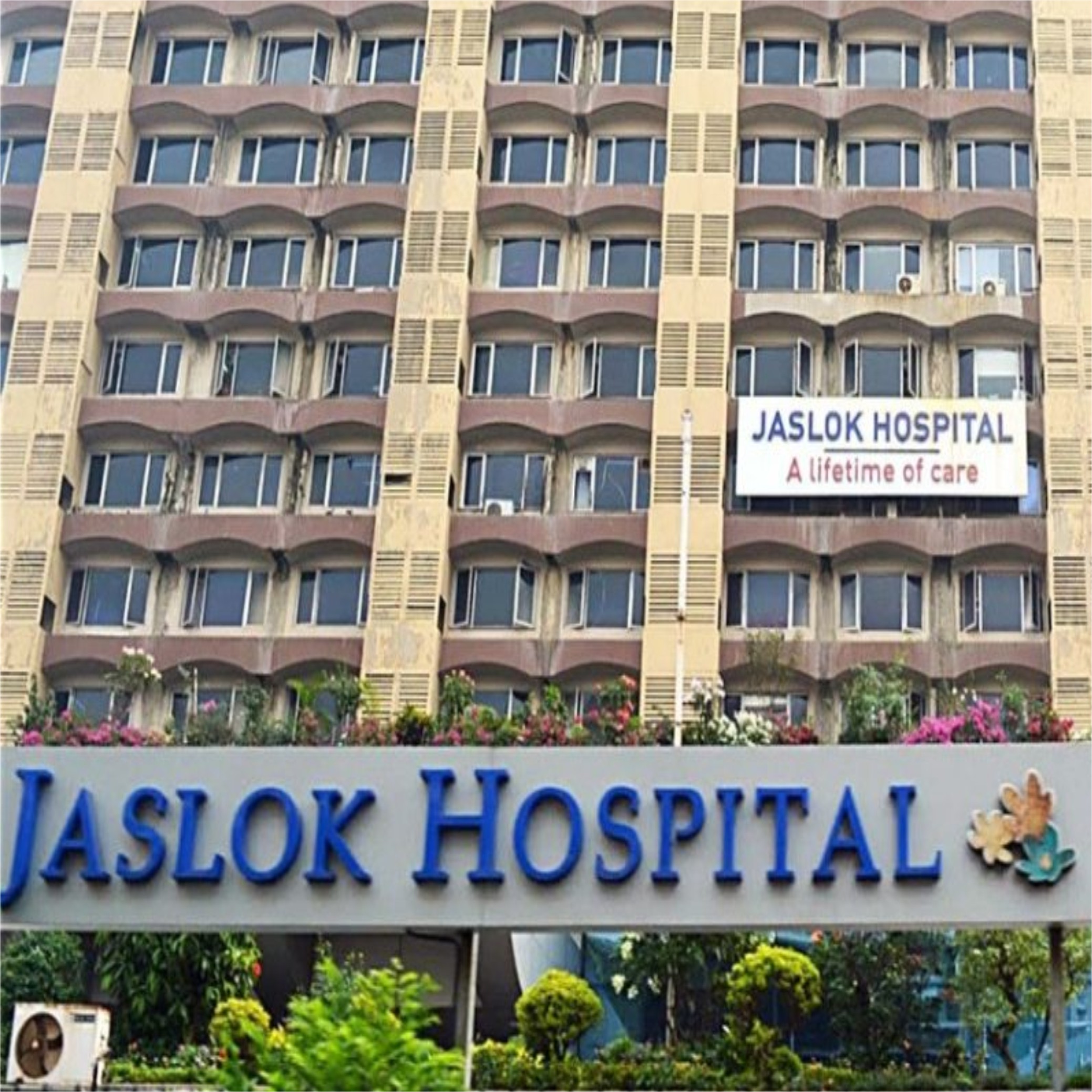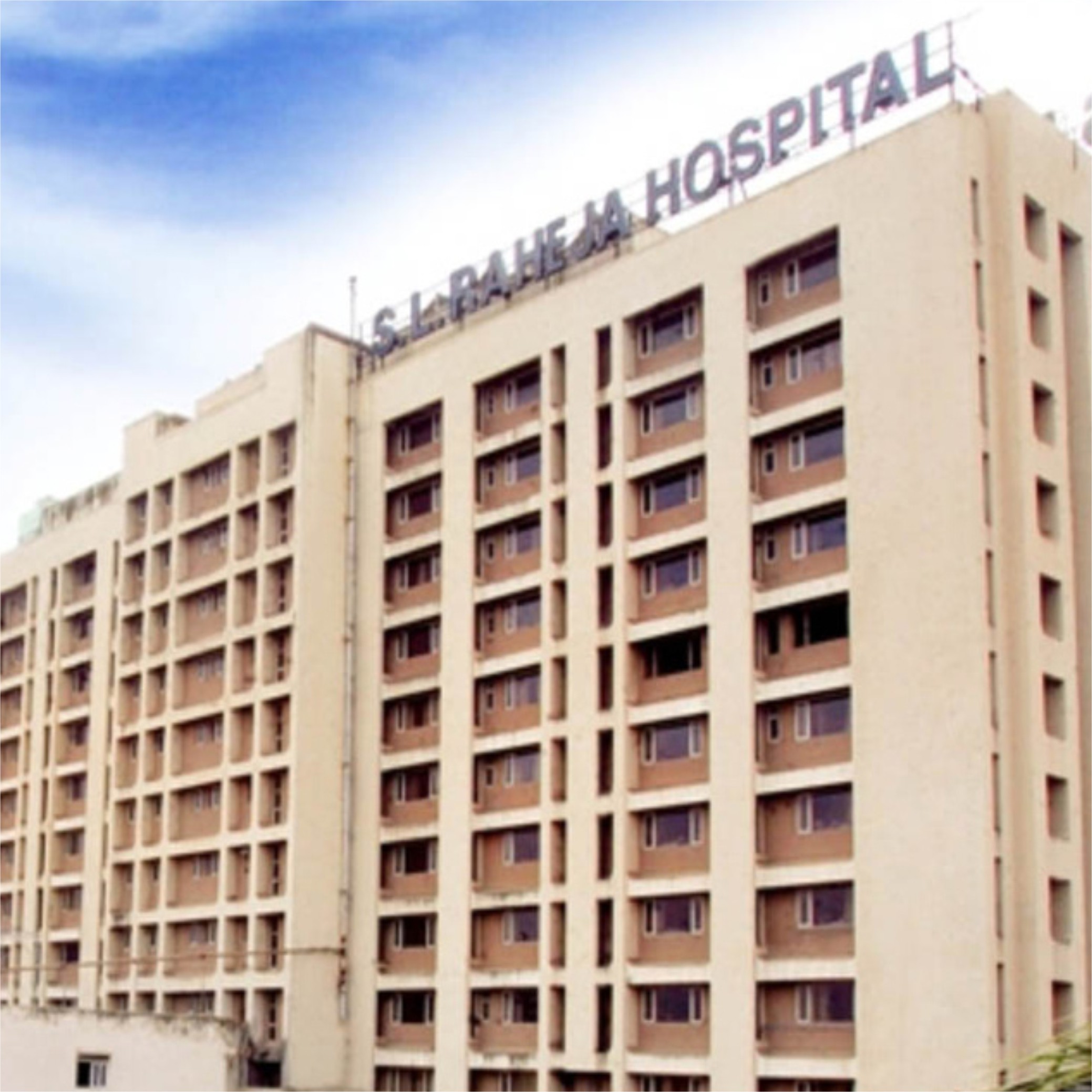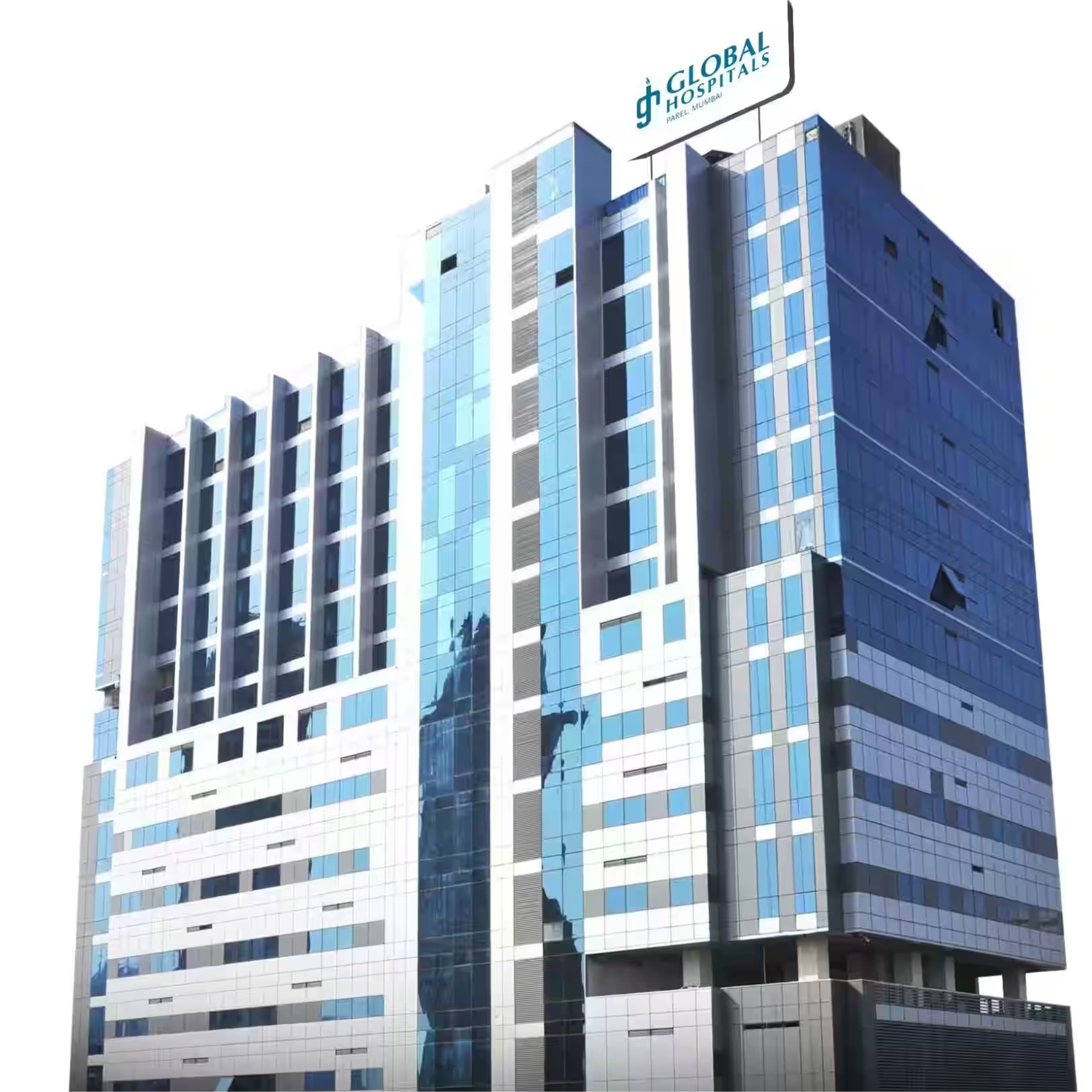Get rid of hip pain with advanced hip replacement surgery in India
Did your doctor suggest you hip replacement surgery?
You might be deferring the surgery perhaps because of fear of surgery, long recovery time and pains, fear of falling, fear of effectiveness of surgery, and uncertainty on results. This could also lead to additional stress and anxiety.
Nowadays, with the advancement in technology, hip replacement procedure has changed drastically in the last decade.
The problems due to alignment and after that associated problems are no more exist with newer procedure techniques such as computer-guided hip replacement and robotic-arm assisted hip replacement.
The hospitalization time is less and fast recovery due to small incision and less trauma of surgery.
Moreover, these techniques ensure perfect and precise alignment and give you peace of mind and relief from ongoing pains and discomfort.
With the help latest techniques and implants, you can also plan to live a pain-free lifestyle. You can walk freely again, and you can resume your hobbies such as cycling and even jogging.
Let me introduce you to Sonam, a 54-year-old woman from Delhi, India. She is the owner of a beauty salon.
Sonam was suffering from osteoarthritis on her left hip for the last 12 years. She was experiencing a lot of pain every day, which has affected her ability to stand, walk, sit, and sleep.


Sonam has shown to many orthopedic doctors, and almost all of them have suggested she do hip replacement surgery. Sonam was scared of being bedridden for a long time and deferred it for a long time.
The longer she deferred the surgery, the deterioration of her hip increases, and constantly increases the dose of pain medicine to deal with her pain. But unfortunately, the medicine would become ineffective after a while.
Sonam’s elder son Ajay was very concerned about his mother’s condition. Ajay did extensive research on the internet and learned about advanced robot-assisted hip replacement surgery. Will researching Ajay visited the MedicoExperts website and left the inquiry on behalf of her mother.
MedicoExperts patient care department got in touch with Ajay, and after receiving all the reports, the MedicoExperts team arranged the online video consultation with its highly experienced orthopedic surgeons from its panel.
The orthopedic doctor explained the robot-assisted hip replacement surgery and cleared all the doubts of Sonam and Ajay. After understanding the procedure, Sonam decided to do hip replacement surgery.
The orthopedic surgeon performed robot-assisted surgery.
Sonam was very happy and surprised to see the surgery’s outcome and the time of the recovery. Sonam was able to walk with ease and without pain within a week.
This could be your story as well. Before understanding different advanced hip replacement methods, first, understand hip replacement.
What is a hip replacement?
Hip replacement surgery, also known as hip arthroplasty, is a surgical procedure for treating hip pain.
Artificial implants are used to replace parts of the hip joint.
A ball (at the top of the femur, also known as the thigh bone) and a socket (in the pelvis, also known as the hip bone) make up the hip joint.
One or both parts of the hip are replaced during hip replacement surgery. The procedure’s goal is to allow you to resume your normal activities and exercise without pain.


What is the main reason for undergoing hip replacement surgery?
When the hip joint is worn or damaged, your mobility is limited, and you are in pain even when you are resting, hip replacement surgery is usually required.
Osteoarthritis is the most common reason for hip replacement surgery.
The most common type of arthritis is osteoarthritis. Osteoarthritis is also called wear-and-tear arthritis, degenerative arthritis, and degenerative joint disease.
A joint is a point where two bones meet. The protective tissue that covers the ends of the bones is called cartilage.
This cartilage breaks down in osteoarthritis, causing the bones in the joint to rub together.
This can result in pain, stiffness, and other symptoms.
Other conditions that can cause hip joint damage include:
1. Rheumatoid arthritis:
Rheumatoid arthritis is an autoimmune disease that affects the joints. This means that your immune system (which is supposed to fight infection) accidentally attacks the cells that line your joints, causing them to swell, stiffen, and hurt. This can cause damage to the joints, cartilage, and nearby bone over time.
2. Hip fracture:
Hip fractures are cracks or breaks near the hip joint in the top of the thigh bone (femur). They’re most commonly caused by a fall or an injury to the side of the hip, but they can also be caused by a health condition that weakens the hip bone, such as cancer.
3. Osteonecrosis (avascular necrosis):
Avascular necrosis is a disease caused by a loss of blood supply to the bone, which can be temporary or permanent. When the blood supply to the bone is cut off, the bone tissue dies and collapses. Avascular necrosis near a joint can cause the joint surface to collapse.
4. Septic arthritis:
Septic arthritis is a type of joint infection that is very serious. It needs to be taken care of as soon as possible. Treatment can help you recover completely, but if you don’t get help, it could get worse.
5. Bone dysplasia’s:
Disorders that cause unusual bone growth.
Robot-assisted hip replacement surgery in India:
Robot-assisted hip replacement surgery is a comparatively less complex procedure that benefits from the precision of the robot to successfully replace the damaged hip joint.
This procedure enables the surgeons to provide a personalized surgical experience for patients depending on their specific diagnosis and anatomy. It is minimally invasive and bone sparing, with minimal trauma and faster recovery. Robot-assisted hip replacement in India is cost-effective and this extremely advanced technique can be opted for in the best hospitals in India.
Advantages of Robot-Assisted Hip Replacement Surgery
- Smaller incisions
- Quicker recovery time
- Accurate placement of the implants
- Lesser damage to surrounding tissues
- Increased implant longevity
Minimally invasive hip replacement surgery in India:
The surgeon can perform the hip replacement through one or two smaller incisions with minimally invasive hip replacement surgery.
Minimally invasive hip replacement procedures use the same artificial implants as traditional hip replacement procedures. To properly prepare the socket and femur and place the implants, specialized instruments are required.
The surgical procedure is similar, but there is less dissection of soft tissue. A single minimally invasive hip incision could be 3 to 6 inches long. It depends on the patient’s size and the procedure’s difficulty. Typically, the incision is made on the outside of the hip. The muscles and tendons are split or detached, but not as much as in a traditional hip replacement. After the surgeon places the implants, they are routinely repaired. This promotes healing and helps to prevent hip dislocation.
A 2- to 3-inch incision is made over the groin to place the socket in a two-incision hip replacement. The stem is inserted through a 1- to 2-inch incision made over the buttock.
X-rays may be required to guide the surgeon during the two-incision procedure. It’s possible that this surgery will take longer than traditional hip replacement surgery.
Advantages of Minimally Invasive Hip Replacement Surgery
- Less pain
- More cosmetic incisions
- Less muscle damage
- Rehabilitation is faster
- Hospital stays are shorter
What are the different types of hip replacement surgery?
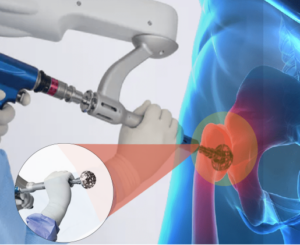
Total hip replacement surgery is the most common type of hip surgery. It replaces the entire hip structure with artificial implants.
Surgeons insert a stem into the patient’s femur, or thighbone, to provide stability during the procedure. They use an artificial cup to replace the natural socket in the hip joint and a ball to replace the head of the femur.
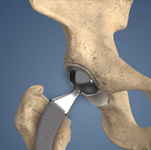
The femoral head, or ball at the top of the femur, or thighbone, is removed and replaced in partial hip replacement. It is not a replacement for the socket.
The top of a stem is attached to a ceramic or metal ball, which is inserted into the hollow center of the femur. Typically, surgeons perform this procedure to repair certain types of hip fractures.
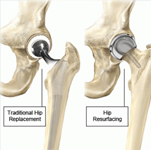 Resurfacing the hips can help relieve pain caused by cartilage loss. Damage to the natural bone ball at the top of the thighbone is repaired by a surgeon.
Resurfacing the hips can help relieve pain caused by cartilage loss. Damage to the natural bone ball at the top of the thighbone is repaired by a surgeon.
After that, he or she resurfaces it with a smooth metal covering. A metal lining or shell is also placed in the natural bone socket of the hip.
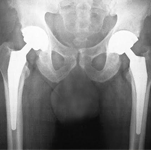
- This surgery is recommended if the patient has a degenerative bone disorder such as osteoporosis and has damage to both hips. Both of the affected hip joints are replaced with prosthetics in this procedure.
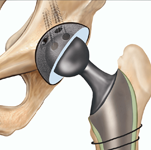 Revision hip replacement surgery is required for patients who have worn-out prostheses. Complications such as infection, dislocation, or bone fractures around the replaced hip necessitate revision hip replacements.
Revision hip replacement surgery is required for patients who have worn-out prostheses. Complications such as infection, dislocation, or bone fractures around the replaced hip necessitate revision hip replacements.

What are the advantages of hip replacement?
The major reason for hip replacement surgery.
- Relief from pain
- Improved movement
- Improved strength
- Coordination of the torso and legs has improved.
- The ability to walk, climb stairs, sit, and maintain an active lifestyle while feeling more comfortable.
Why you should not delay hip replacement surgery?
Some of the risks associated with postponing hip replacement surgery include:
With increasing joint deformity, joint replacement can become more complicated. To correct the deformity, your surgeon may need to use specialized implants or perform more extensive surgery.
In a similar manner, as joint arthritis worsens, the joint becomes less mobile. Soft tissues surrounding the joint, such as muscle, ligaments, and the joint capsule, may contract as a result of less movement, causing stiffness.
This is especially true for patients who are having a hip replacement, as mobility prior to surgery is one of the best predictors of expected motion following surgery.
Muscles surrounding the joint are likely to weaken as arthritis progresses. As a result of their pain, people use the joint less and limit their physical exertion. Rehabilitation after surgery may become more difficult as the muscles weaken, and the muscles may never regain their full strength.
The affected joint’s function deteriorates. As a result, the other joints of the body are forced to work harder, increasing stress and the risk of joint damage.
Patients may develop other medical issues as a result of their reduced mobility. As weight gain can lead to heart and lung complications, as well as a loss of stamina.
As joint damage worsens, the need for painkillers increases, potentially leading to an increase in complications from long-term painkiller use.
What are the symptoms of hip replacement?
Some of the following symptoms may be related to conditions that hip replacements address. They include:
- Pain in the anterior hip or groin.
- Pain in the buttock and trochanteric region.
- Pain with activity and at rest.
- When you put weight on your leg, the pain gets worse.
- Stiffness/tightness of the hip.
- Loss of motion.
- Difficulty sleeping.
- Difficulty walking.
- Difficulty putting on shoes and socks.


What is the success rate of hip replacement in India?
The success rate of hip replacement surgery in India is over 95 percent. Most of the individuals undergoing hip replacement surgery encountered pain relief. It is estimated that the patient will be pain-free for the next 25 years to come.
Total hip replacement surgery is one of the most successful and cost-effective medical interventions.
It is expected that about 90-95% of patients can have their total hip replacement functioning 10 years after the surgery, while about 85% can expect the functionality of the total hip replacement functional 25 years later.
It is observed that patients have found improvement in mobility and freedom from chronic pain.
Now, let us understand the hip replacement surgery cost in India and factor that drives the cost.
What is the cost of hip replacement surgery in India?
- Total Hip Replacement (THR) surgery cost in India ranges from INR 3,50,000 to INR 4,50,000 (4200 – 5400 USD).
- Partial Hip Replacement (PHR) surgery cost in India ranges from INR 2,00,000 to INR 3,00,000 (2400 – 3600 USD).
- Revision Hip Replacement surgery cost in India ranges from INR 3,00,000 to INR 4,50,000 (3600 – 5400 USD).
- Hip Resurfacing surgery cost in India ranges from INR 2,00,000 to INR 3,00,000 (2400 – 3600 USD).
The cost of the surgery depends upon the type of surgery, the material of the implant, and the surgical approach.
The orthopedic surgeon would suggest a medical evaluation to determine the extent of the damage to the joint and other medical factors.
Based on this evaluation report and the condition of the patient, the hip replacement surgeon will recommend the best treatment plan for the patient.
MedicoExperts ensure the quality of treatment at a very decent price in great state-of-the-art facilities furnished with top-notch infrastructure.

Procedure for Hip Replacement Surgery
Frequently Asked Questions and patient concerns:
1. How long will I be in the hospital for my hip replacement surgery?
In general, a hospital stay of 3-6 days is to be expected. Pain medications will be administered to manage the pain after the surgery. Depending on the recovery, rehabilitation and overall health of the patient, it could take anywhere between 3 to 6 months to make full recovery after the surgery.
2. What material is the hip implants made of?
The implants are actually three different prostheses for a complete hip substitute: the stem, the ball, and the socket.
- The stem is constructed of metal, generally titanium or chrome-cobalt. This is placed inside your thighbone.
- Usually, the ball is made of polished metal or ceramic and fits over the stem.
- Usually, the socket is a combination of a plastic liner and a chrome-cobalt or titanium backing.
3. Will the new hip implant start the metal detectors at the airport?
The delicate screening machines used at the airport will detect but can also recognize the implant efficiently. It’s best to say that you’ve had a hip replacement for airport security. The machine operator will understand that it is not an unlawful metal object outside the body, but an implant. You may ask the office of your doctor if they can provide a card identifying you have obtained a metal-containing hip implant.
4. How should I prepare for my hip replacement surgery?
You will need a physical examination and pre-admission test before surgery, participate in pre-operative education classes, and prepare your home for returning after surgery. While these measures may take a few weeks, after your hip replacement surgery they will assist you attain long-term success.
5. How do I sleep at night to keep my hip safe and comfortable?
It should assist to maintain your hip comfortable and stable by placing a pillow between your legs. Depending on what makes you most comfortable, you can sleep on your back or on either side.
6. After surgery, what activities should I refrain from doing?
Keeping your new joint moving is essential. You should gradually return to ordinary activities, though. Your joint replacement care team will instruct you to prevent particular positions that might stress your new joint. Refrain from high-impact activities and consult your surgeon before taking part in a fresh exercise routine or sport that is physically demanding.
7. If you have a hip replacement that is minimally invasive, is the range of movement lost?
After minimally invasive surgery, hip movement is the same as standard hip replacement. Total hip replacement surgery is performed to alleviate pain and return patients to an ideal function level. The method of rehabilitation guarantees that patients perform particular exercises to enhance movement variety and strengthen leg and hip.
8. What are the advantages of robotic knee procedure over traditional knee replacement procedure?
The advantages of a robotic knee procedure over a traditional one are numerous. These benefits include better implant positioning, precise cuts over the bone, minimal human interference, quick recovery, and a short stay in the hospital.
There is less tissue trauma, less blood loss, and a faster recovery time due to the accuracy and precision with which the surgery is planned and executed.
Best hip replacement hospital in India
The best hip replacement hospitals in India are world-renowned and have international standards of protocol and patient care. The MedicoExperts associated hospitals in India are JCI, ISO, and NABH accredited and have a high quality of healthcare coupled with the latest technologies and surgical innovations. The list of the associated best hip replacement hospitals in India are:

MedicoExperts is a Global virtual hospital which is established to offer quality healthcare services at affordable pricing without compromising the success rates of the treatment.
MedicoExperts is having a network of highly experienced super specialist doctors and well equipped hospitals across the globe and offering second opinion through online video consultation and surgical interventions through its empanelled super specialist doctors at its network hospitals in 17 countries from 3 continents.
By the virtue of its approach and model, MedicoExperts is successfully achieve to deliver
- Latest and most advanced treatments with success rates of international benchmarks.
- Multiple cost options depending upon the hospital facilities, with the same doctor.
- Treatment option in multiple cities/state/countries.
- Trust and peace of mind.
Most suitable for patients who are looking for:-
- Planned Surgeries and treatment from most experienced doctors and at multiple cost options as per hospital facilities with best possible outcomes.
- Second Opinion from expert doctors.
- Complex cases involving multi specialities
- International patients looking for treatment from Indian doctors

Author Bio:
Dr. Subhamoy Mukherjee – Ph.D. (Oncology)
Dr. Subhamoy Mukherjee is a molecular oncologist with experience of working with genomic profiles. He has several years of experience in scientific writing. He takes strong interest in making people aware of different treatment approches in cancer, acute and chronic diseases. He also has interest in innovative approches for treating different mental and physical illnesses.
Content Medically Reviewed By MedicoExperts Editorial & Clinically Review Board










